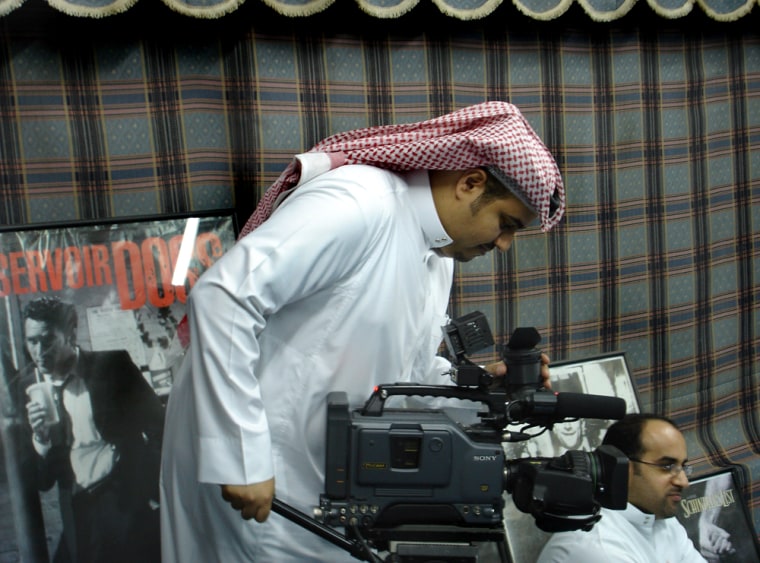Shortly after Tareq al-Hussein turned 21, he got himself a passport and drove 300 miles to neighboring Bahrain to fulfill a dream: watching a film in a movie theater.
Al-Hussein's first cinema experience has been captured in a documentary called "Cinema 500 km," the distance in kilometers from Riyadh to the nearest cinema, which outlines the plight of movie buffs in a country that has no commercial theaters.
"If you factor in the cost of the trip to Bahrain, Saudis pay close to 250 riyals ($67) per film. It's the most expensive ticket in the world," said Abdullah Eyaf, the director of the 45-minute documentary.
More Saudis like Eyaf are speaking out about the issue, hoping their voices will one day bring movie theaters back to the country. Several Saudi newspapers now have a weekly movie page that highlights the cultural values of movies. An official Saudi TV station hosted a program on the subject. Cartoon movies were shown at a summer festival in the southwestern province of Asir and during a feast in Riyadh. And a few Saudi movies with no chance of officially being shown in the kingdom are taking part in film festivals worldwide.
But the idea of actually showing movies inside Saudi Arabia still is not acceptable to all Saudis. Conservatives consider movies a bad influence and have even protested the showing of films on the national Saudi airline.
According to Asharq al-Awsat daily, the air carrier is flooded with requests from travelers who want it to cancel its movie shows or replace them with films "where there's no mixing" of the sexes.
Although there are no theaters in the country, Saudis can watch movies at home. There are numerous video stores that stock the latest releases after kisses and other such scenes have been cut out. Also, most homes have satellite dishes that allow access to movie channels.
The kingdom has not always been cinema-free. In the 1960s and until the early 1980s, when the government gave free rein to the more rigid wing of the strict Wahhabi stream of Islam it follows, there were movie theaters across the kingdom.
The theaters were not regulated, and members of the religious police, the muttawa, actively tried to shut them down. The muttawa are government-paid agents of the Committee to Prevent Vice and Promote Virtue that prowl malls and streets to ensure Saudis comply with strict codes of behavior and dress.
"We kept young men on bikes stationed near the offices of the muttawa," recalled Abdul-Wahhab al-Sanyour, who worked as a projectionist. "When they saw the muttawa heading our way, they would fly on their bikes to alert us. We didn't have mobile phones then."
The staff at the theater would quickly turn off the lights in the entrance area, shut the doors and keep quiet to give the impression the cinema was closed, said al-Sanyour, 52. Since the theater itself was soundproof and distant from the entrance, the show would go on without interruption, added al-Sanyour, who now has a video store in Jiddah.
Al-Sanyour began his career at the age of 10, when he would go to the homes of Saudis with big reels for private movie showings in living rooms and gardens. Because of the strict segregation rules, a boy was more acceptable for a female audience.
In the early 1980s, movie theaters started to shut down. Raja al-Mutairi, who writes about the cinema for Al-Riyadh daily, said the closures coincided with the rise in the number of video stores and with increasing conservatism in the kingdom.
He said movie theaters acquired a bad reputation because of the kind of films the early theater owners would choose on trips to Egypt and other Arab countries.
"They favored superficial movies with a decadent, sexual orientation that brought in large profits," he said. "The cinema became synonymous with everything that is corrupt and it became an evil symbol in people's head, one that will destroy their identity."
Al-Mutairi said there is no law that bans cinemas, but he said Saudis are unwilling to open theaters for fear of a clash with Islamists.
"No one wants a confrontation with the street," he said.
He and other movie aficionados are encouraged there were no disruptions of the cartoon shows, shown solely for women and children, in Asir and Riyadh.
"That signals some kind of acceptance to the idea of movies," said al-Mutairi.
Until the unofficial ban on movie theaters is reversed, movie fans are seeking outlets through which they can lobby for cinemas. One such outlet is a popular Saudi Web site, started in 2000, where Saudis can read about the latest releases and discuss movies in chat rooms.
Al-Mutairi and a group of about 50 men who subscribe to the site have rented a hall in Riyadh where they meet to watch DVDs. It's really not a movie theater and only men are allowed, but the group's goal is to have it licensed as a cinema.
Al-Hussein, who markets a children's magazine, said his first trip to the movies will always be special.
"In films, I had always seen stars meeting their girlfriends at the movies or seen an actor munching on pop corn. But I never really knew what it felt like," he said.
"In the theater, the emotions I had were more intense than those I had watching a movie alone. When I was laughing, everybody else was laughing. When I got scared, everybody else got scared," added al-Hussein. "It was an experience I'll always be proud of."
